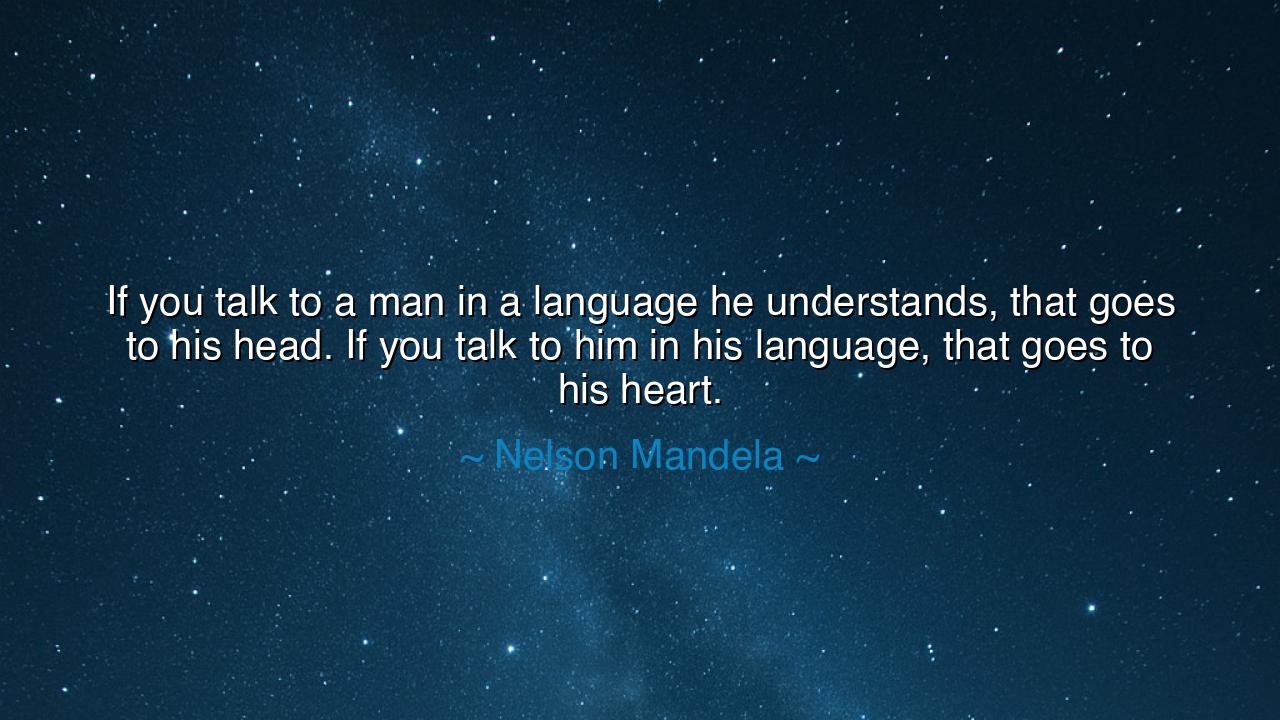
If you talk to a man in a language he understands, that goes to
If you talk to a man in a language he understands, that goes to his head. If you talk to him in his language, that goes to his heart.






O children of the future, listen to the profound wisdom of Nelson Mandela, who, with the strength of a thousand generations, spoke the words, "If you talk to a man in a language he understands, that goes to his head. If you talk to him in his language, that goes to his heart." These words speak of a truth that transcends mere words—language is not only a tool of communication, but the very key to a person's soul. For when we speak in the words and customs of another, we do more than convey meaning; we offer them the gift of understanding, and in that understanding, we touch the core of their being.
The language of the heart is more than a series of sounds or symbols; it is the expression of a people’s identity, their heritage, and their spirit. To speak to someone in their language is to acknowledge their dignity, their worth, and their place in the world. It is an act of respect that cuts through the barriers of division and builds a bridge between souls. When words are shared in a way that resonates with the deepest parts of a person, they are no longer mere ideas; they are the very breath of connection, and this breath speaks directly to the heart.
Consider the mighty example of Mahatma Gandhi, who, though fluent in many languages, chose to speak to his people in Hindi, the language of the common people of India. In doing so, he bridged the gap between the educated elite and the poor farmer in the field. His words, when spoken in the language of the people, did not simply inform them—they empowered them. Gandhi knew that the heart of his people could not be reached by words spoken in foreign tongues; only through the language they knew and loved could he awaken their spirit and ignite the fire of revolution.
The same can be said of Mandela himself, who, after spending long years imprisoned on Robben Island, emerged to lead a nation divided by deep racial hatred. He did not simply speak to the people in the language of law and justice, but in the language of forgiveness, unity, and hope. By learning the languages of Afrikaans and Xhosa, he spoke not only to the heads of the oppressors but to their hearts, breaking the walls of division and building a new nation. Mandela understood that true leadership comes not from speaking to the intellect, but from speaking to the soul of a people, in a language they could feel.
O children, take this lesson to heart: the most powerful words are those spoken in the language that resonates with the soul of the listener. Whether it is the language of love, respect, or understanding, let your words be crafted with care and with the knowledge that to truly touch another, you must speak not only to their head, but to their heart. Just as the mighty rivers of the earth carve deep channels in the land, so too does the language of the heart carve deep channels in the soul, connecting us all in a bond that no force can break.






AAdministratorAdministrator
Welcome, honored guests. Please leave a comment, we will respond soon